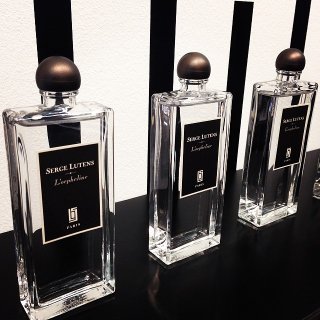I guessed the nun reference was an indicator that the perfume would pull us back into the territory through which Lutens has wandered for the last 3 or 4 years. I wasn't wrong. In 2011/12, his Jeux de Peau and Santal Majuscule were like an explosion of reminiscence, using gourmand notes to make insistent statements about childhood. Then the mood began to darken. In 2013, La Fille De Berlin emphasised the pain of looking back, using its sub-zero rose to evoke the anguish of nostalgia. And last year, with L'Orpheline, the tone became even more introspective, balancing heartache with tenderness. La Religieuse feels very much like the next instalment in this increasingly absorbing story; after all, its name alludes to yet another female figure.
On an objective level, the scent is a soapy floral. The pre-release material has suggested that its main note is jasmine - and white petals are definitely present - but it's years away from the grandiloquent voice of A La Nuit and Sarrasins. In fact, the animalic aspect of the jasmine seems to have been eradicated completely, to be replaced by much more quietly-spoken blooms, namely honeysuckle, narcissus and mimosa. The wispy bouquet is tied with a translucent ribbon of grass and wrapped in a familiar-smelling embrace of velvety musks. It doesn't sound hard-hitting and indeed, it isn't. Think of Jean-Claude Ellena's La Haie Fleuri (L'Artisan Parfumeur) and you'll get a sense of its breath-on-the-wind elusiveness.
However, it becomes more interesting when placed within the narrative context described above. L'Orpheline was frightened, uncertain, full of trepidation, but La Religieuse begins to venture into the world with a tiny bit more confidence. It's still hesitant, likely to curl its petals into a ball at the first sign of danger, but it also allows itself to succumb to the enticements of optimism: somewhere, at the edge of its virtuous garden lies an open meadow, filled with the sins and purities of a world beyond a picket fence.
That said, for all its verdant innocence, the perfume isn't always easy to read. Its minimalist aesthetic brings with it a reluctance to reveal all its secrets. Yes, the floral line running through its centre is lucid, but it's punctuated by several perplexing, decidedly synthetic accents. These range from almost-unnoticeable incense notes, to a barely-there ghost of blackcurrants, and even, brace yourselves, an intimation of Johnson's baby shampoo, circa 1985. The latter may well be nothing more than a sly wisecrack on Sheldrake's part - was there a French equivalent of the stuff and, if so, could Lutens have been aware of it? - but nonetheless, it's intriguing. With its evocation of childhood bath rituals and steamy rooms filled with soap suds, it ties in with the fragrance's 'juvenile' plot, but it also appears to make a wider comment about mainstream perfumery's current obsession with fruity shampoo accords. If Lutens' Eaux series is an attempt to find new ways of saying 'clean' in perfume-speak, then perhaps La Religieuse tries to suggest that not all 'bath product scents' have to be mindless clones of each other, although it's probably too demure to cause mainstream perfume styles to change in any meaningful way.















